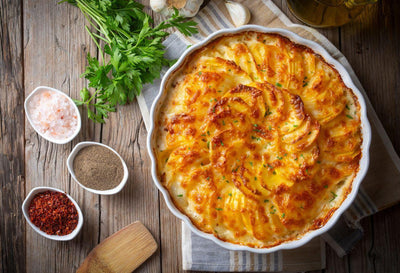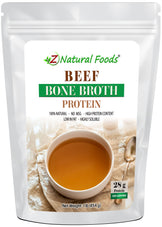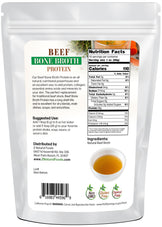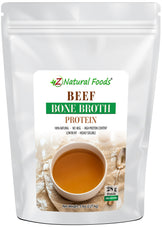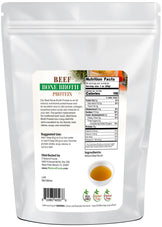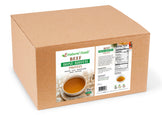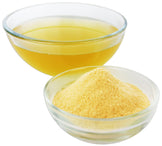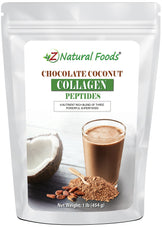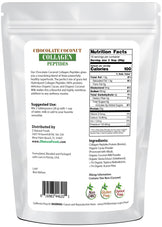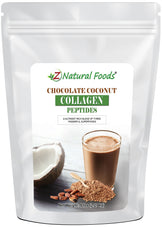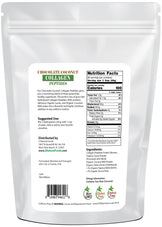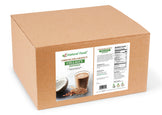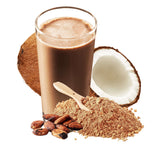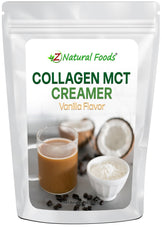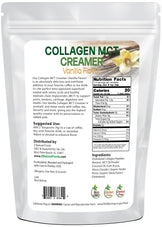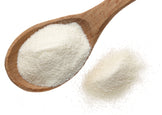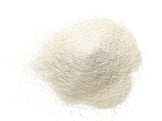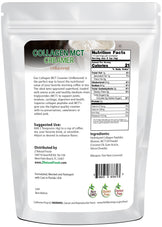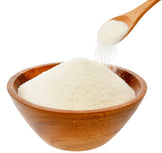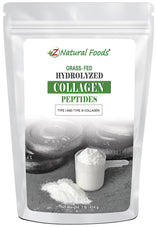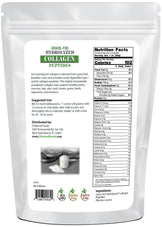Description
Description
When considering what supports the thriving human species, carefully looking at what nourishes our structural foundation is essential.
The foundation of the human structure is a perfect creation of bones, joints, ligaments, cartilage, tendons, and muscle.
What is the difference between beef collagen, chicken collagen, and marine collagen?
While each source of collagen primarily contains an abundance of one or two specific types of collagen, all sources have small amounts of a wide range of collagen types.
Beef is primarily made up of Types I and III collagen. Chicken is primarily made up of Type II collagen. And the marine source is primarily made up of Type I collagen.
These moving parts have been strategically created to support one another in:
- Optimizing movement
- Agility, and
- Strength
- All protect our anatomy and physiology.
In simple terms, it is support for optimally surviving and thriving.
Unfortunately, as we age, these essential parts eventually wear down.
Collagen contains some unique compounds that are found in no other food. These unique attributes make collagen a genuinely fantastic food and traditionally considered a foundational food for what ails you.
To understand the difference between the various sources (land animal and marine) of collagen, it is essential to review some general information about collagen.
First, let’s discuss the breakdown and function of collagen.
Collagen is a protein the body produces that is essential in supporting the structure and function of hair, skin, nails, cartilage, bones, blood vessels, and connective tissue.
- Collagen is the human body's most abundant protein, representing 35% of its dry weight,
- Collagen is composed of 19 essential and nonessential amino acids and composed of three chains wound into a tight helix, with each chain being 1400 amino acids long.
- Collagen is primarily made up of the amino acids Glycine (33% of total collagen), hydroxyproline and proline (22% of total collagen), and glutamate (derived from its precursor glutamine and an essential precursor for proline).
While there are technically 28 types of collagen that differ based on molecular assembly, cell components added, and where the collagen is used in the body, there are five primary types.
- Type I makes up 90% of your body’s collagen and is densely packed to provide structure for your skin, bones, tendons, and ligaments.
- Type II is found in elastic cartilage, gives cartilage strength and elasticity, and provides joint support. It supports the binding process with the help of fibronectin(A glycoprotein that plays an essential role in tissue repair) and other collagens.
- Type III is a significant extracellular matrix component found in muscles, arteries, blood vessels, and organs. Specific to tissues with large portions of elastic fibers. Type III collagen also interacts with platelets in the blood clotting cascade and is an essential signaling molecule in wound healing.
- Type IV is the primary component of basement membranes(thin layers of the extracellular matrix that form supportive structures) found in layers of your skin, forming their backbone.
- Type V is a fibrillar collagen(essential for forming collagen fibers)of types I and III collagen, optimal for the formation and quality of tissue. Type V collagen contributes to the bone matric, corneal stroma, and interstitial matrix of muscles, liver, lungs, and placenta.
Next, let's review the attributes of hydrolyzed collagen.
It is crucial to understand that hydrolyzed collagen may go by several other names, like collagen hydrolysate and collagen peptides.
All collagen, by definition, is technically hydrolyzed, but there are different levels to this process (partially and fully).
For example, gelatin is partially hydrolyzed, and collagen peptides are fully hydrolyzed.
Finally, hydrolyzed collagen is, by definition, a denatured protein.
Now, to understand what hydrolyzed collagen is, it is also essential to understand the hydrolyzation process. Hydrolyzed collagen is created through hydrolysis, a process where water molecules rupture the chemical bond. There are various methods to complete this process and produce hydrolyzed collagen.
The first can be observed by the thermal treatment of collagen above 40 degrees Celcius. Once the chains are separated, hydrolysis is carried out by the action of proteolytic enzymes resulting in hydrolyzed collagen or peptides. This end product has a low molecular weight, and its solubility and activity will vary based on the type of enzymes used in the process. The other kind of hydrolysis is through the use of hydrochloric or phosphoric acid or an alkaline method which all produce a high salt concentration in the final product.
Essentially hydrolyzed collagen is collagen broken down into smaller protein chains creating peptides for easier digestion and better absorption.
So, what is the difference between the different sources of collagen – beef, chicken, or marine collagen?
In simple terms, this comes down to the animal from which the collagen is sourced.
It is essential to understand that while each source primarily contains an abundance of one or two specific types of collagen, all sources have small amounts of a wide range of collagen types.
Chicken Collagen
Chicken is primarily made up of Type II collagen, which is found in elastic cartilage, gives cartilage strength and elasticity, and provides joint support. It supports the binding process with the help of fibronectin (A glycoprotein that plays an essential role in tissue repair) and other collagens. This type of collagen is derived from chicken sternum cartilage.
In simple terms, type 2 collagen is a peptide and component of joint cartilage. Type 2 collagen can be found as hydrolyzed or undenatured.
In a randomized controlled trial looking to determine the efficacy of undenatured type 2 collagen in modulating knee osteoarthritis symptoms, the results showed that the collagen group demonstrated a significant reduction in the overall WOMAC score (Western Ontario McMaster Universities Osteoarthritis Index) compared to the placebo group. Therefore, it was concluded that this specific form of undenatured type 2 collagen is well tolerated and improves knee symptoms.
Beef Collagen
A good portion of the market's hydrolyzed / peptide collagen products come from beef bones (unless otherwise noted) and are a quality source of Types I and III. As mentioned earlier in the article,
- Type I makes up 90% of your body’s collagen and is densely packed to provide structure for your skin, bones, tendons, and ligaments.
- Type III is a significant extracellular matrix component found in muscles, arteries, blood vessels, and organs. Specific to tissues with large portions of elastic fibers. Type III collagen also interacts with platelets in the blood clotting cascade and is an essential signaling molecule in wound healing.
While more human research is necessary, there is preliminary evidence that speaks to the potential of beef-sourced collagen. An article titled Collagen hydrolysate for the treatment of osteoarthritis and other joint disorders: A review of the literature concluded that a growing body of evidence provides a rationale for the use of collagen supplements for people with Osteoarthritis.
A double-blind, placebo-controlled, randomized clinical study on the effectiveness of collagen peptides on knee Osteoarthritis specific to improvement in treatment, concluded,
“The study demonstrated that collagen peptides are potential therapeutic agents for the management of osteoarthritis and maintenance of joint health.”
Marine Collagen
Marine collagen is a form of collagen sourced from the bones, skin, fins, and scales of fresh or saltwater fish, jellyfish, sponges, sea urchins, octopus, squid, and prawn. Marine collagen is primarily made up of Type I. According to the Journal of Applied Pharmaceutical Science, marine source collage has advantages over a land animal source.
- Free of zoonosis such as BSE, TSE, and FMD
- A high content of collagen
- Environment friendly
- Has lower body temperature than land animals, thereby aiding in greater absorption
- Greater absorption due to low molecular weight.
- Less significant religious and ethical constraints
- Minor regulatory and quality control problems
- The presence of biological contaminants and toxins is almost negligible
- Low inflammatory response
- Less immunogenic
- Metabolically compatible
While much more human research is needed, Marine collagen has been shown in preliminary research and some small clinical studies to support skin health.
In a clinical lab study, fish skin peptides were combined with skin-targeting antioxidants like coenzymeq10, grape-skin extract, luteolin, and selenium. They were given to volunteers for two months to examine how they affected the following.
- Skin properties (moisture, elasticity, sebum production, and biological age)
- Ultrasonic markers (epidermal/dermal thickness and acoustic density)
The markers were measured three times; Two months before treatment and before and after treatment. It was concluded that the supplement remarkably improved skin elasticity, sebum production, and dermal ultrasonic markers. It was also stated, “Metabolic data showed a significant increase of plasma hydroxyproline and ATP storage in erythrocytes.” Therefore, it was concluded, “A combination of MCPs with skin-targeting AOs could be an effective and safe supplement to improve skin properties without risk of oxidative damage.”
In a paper titled Marine Collagen: A Promising Biomaterial for Wound Healing, Skin Anti-Aging, and Bone Regeneration reviewing in vitro and in vivo research on the effects of marine collagen, it is believed that marine collagen is a versatile compound and may show promise for supporting the healing of a wide range of skin injuries and a healthy aging process. This paper concluded the following.
Therefore, it is believed that there should be continued investigations into marine
Finally, a 12-week, triple-blind placebo study used to evaluate the efficacy of marine collagen on the skin health of women between the ages of 45 and 60 concluded the following:
Fish collagen was safe, well tolerated, and supports its use for improving skin health.
Which is healthier, bovine or marine collagen?
– This comes down to your goals
Every culture defines how and why an individual food is considered “healthy” based on various factors.
According to Western medicine, healthy food is a substance that provides the nourishment needed to sustain well-being and retain energy.
Traditional Chinese Medicine looks at food from a slightly different perspective. According to TCM, food is not defined as healthy or unhealthy but, instead, if it is the right food for an individual at a specific time. According to Traditional Chinese Medicine (TCM), all foods have energy.
TCM teaches us that foods have Yin/ Yang energy, five temperatures, five flavors, and four directions. In these principles, Yin and Yang's action is the general property, and temperature is the extremeness of the properties.
- In simple terms, Yin is cooling, builds blood, and has downward moving energy.
- Yang is warming, energizing, and has upward-moving energy.
TCM also believes that it is best to eat most foods cooked and warm during the cold months of winter for better digestion and utilization and to keep you warm and well-nourished. In the warm summer months, when people are out and moving around, TCM generally looks at lighter, more cooling diets with more fresh produce as naturally healthy.
What are the criteria for defining what is healthy?
Good health is defined as the absence of illness and a well-rounded state of physical, mental, and social well-being.
Health is influenced by many factors like genetics, behavior, environmental and biological influences, and social factors. All of these influences are affected by daily habits that may profoundly affect well-being and longevity.
While hydration, movement, sleep, having outlets, and finding purpose are essential, our food choices for nourishing our bodies are vital. While the basic standards for what is considered a healthy food often come down to whether it has essential nutrients to sustain life, here at Z natural foods, we like to take it up a notch.
We consider healthy foods as getting a well-rounded superior level of nourishment that allows you to thrive and not just survive.
In simple terms, the answer to which source of collagen is healthier comes down to your purpose for using collagen and if you have specifically defined goals.
As stated above, while there are general guidelines for determining what is healthier, your desired result plays an essential role in those guidelines.
In the end, picking any individual or mixture of the different sources of collagen will provide you will an enormous amount of quality nourishment, a wide array of unique compounds, and a powerful foundational food for supporting a quality active lifestyle.
In conclusion, collagen has a well-established background based on tradition in various cultures and a growing body of evidence supporting (what, up to this point) was considered anecdotal evidence to shine a light and bring a better understanding surrounding the complexities of this uniquely outstanding food.
We are hopeful that as time marches on, we will see more vital information surrounding this fundamental food.
For more information about our specific collagen products, go here:
- Hydrolyzed Collagen Peptides -Grass-fed
- Chocolate Coconut Collagen Peptides
- Collagen Creamer (Vanilla Flavor)
- Berry Punch Collagen Peptides
- Collagen MCT Creamer (Unflavored)
To review all of our collagens go here:

